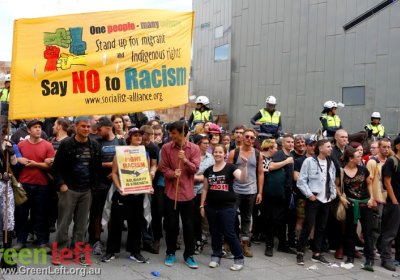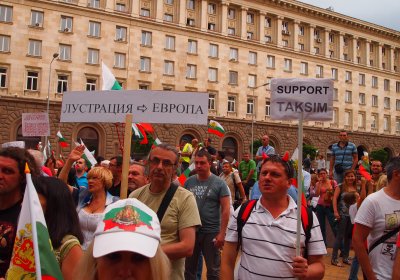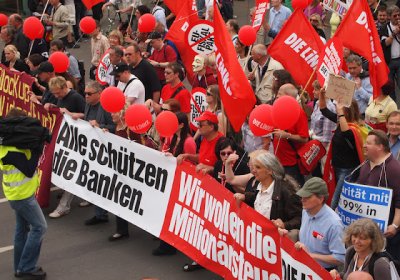As the left in Australia faces the need to organise against escalating racism from mainstream politicians and the far right, important lessons can be learned from anti-racist struggles across the world.
Sibylle Kaczorek is a Socialist Alliance activist now living in Melbourne who was active in anti-racist campaigns in Germany. She spoke to Green Left Weekly's Nick Fredman.
* * *
Despite Germany officially becoming an anti-fascist state after World War II, there have been continuing connections between the far right and the state haven’t there?
Sibylle Kaczorek
The campaign against racism and the far right needs a clear understanding of racism and fascism and how to fight these threats.
Racism is not inherent in human beings. It is a product of capitalism. Racist scapegoating is used by the corporate rich because it undermines solidarity among workers, opening the way for conservative policies such as privatisation and cuts to social spending.
The upcoming federal elections in Germany, scheduled for September 22, are unlikely to change the character of German politics regardless of the outcome.
The two main parties remain committed continuing to represent the interests of German corporations over its people.
Die Linke (The Left Party) provides a left parliamentary alternative, but it has not succeeded in convincing ordinary, working people that a break of the status quo is possible.
Every Parent's Nightmare
By Belinda Hawkins
Allen & Unwin, 2013
www.everyparentsnightmare.com
Jock Palfreeman, an Australian man sentenced to 20 years in jail in Bulgaria for murder in a deeply flawed trial, had his request to be transferred to an Australian jail turned down on July 10.
Belinda Hawkins' book, Every Parent's Nightmare, brings to life the tragic story of Palfreeman, whose fearless commitment to human rights led to a 20-year sentence in Bulgaria.
Bulgarians voted for a new parliament on May 9, two months ahead of schedule. It came after mass protests against poverty and economic disadvantage forced the centre-right Citizens for European Development of Bulgaria (GERB) government to resign.
The elections, however, reflected a polarised political landscape and one devoid of left forces. GERB received most votes with 30.71% (97 seats). The second-largest party, the Bulgarian Socialist Party won 27.02% (84 seats). The 2005-09 BSP government was marked by neoliberal policies and corruption scandals.
Sibylle Kaczorek and Jody Betzien, from the Australian Socialist Alliance, interviewed Yiannis Bournous in Athens. Yiannis is a leading activst in the Coalition of the Radical Left (Syriza), Greek's rapidly growing left party.
Germany is usually presented in the mainstream media as having successfully weathered Europe’s vast economic crisis. German Chancellor Angel Merkel from the Christian Democratic Union (CDU) has gained enormous influence on the European political and financial scene.
By contrast, in protests across Greece, Spain and other countries hit hardest by the crisis, references about Germany as the “Fourth Reich” are increasingly being voiced.
Germany's Die Linke (The Left) party elected a new leadership team at its June 2-3 congress. It came at a time of rising economic and social crisis in Europe, as well as losses for Die Linke in recent state elections.
Die Linke was formed in 2007 as part of a unification of two parties, one with a base in the old eastern states (the PDS) and the other based in the western Germany (the WASG). Between 2007 and 2009, Die Linke achieved strong electoral results in federal elections and was represented in all state parliaments.
Up to 30,000 protesters from across Europe took to the streets on May 19 in the financial district of Frankfurt. The rally, which lasted for seven hours, ended outside the European Central Bank (ECB).
The protest, “Blockupy Frankfurt”, was part of a three-day action, organised to oppose the European debt crisis policies of the “troika” made up of the ECB, the International Monetary Fund and the European Commission.
These polices include the so-called Eurozone bailout funds, which have helped push people across Europe into poverty and the dismantled democratic rights.
Voters in Germany’s largest state of 18 million people, North Rhine Westphalia, went to the polls on May 13 to reject Chancellor Angela Merkel’s politics.
This came a week after the loss for Merkel’s Christian Democratic Union (CDU) in the election of Schleswig Holstein. These results mark a rejection of the hard line austerity politics pushed across Europe by the Merkel-led coalition government.
About 215,000 public service workers struck on March 27 as a warning to their employers a day before talks between the public sector union and the bosses.
Two weeks earlier, 130,000 took part in the first round of strikes. The award being negotiated by the United Services Union (known as ver.di) covers more than 2 million public service workers from national to local level.
Ver.di is Germany's second biggest union, with a membership of about 2.1 million people.
Ten thousand people mobilised in Dresden on February 18 to stop an annual march of European neo-Nazis.
A broad coalition of political parties, church groups, trade unions and other anti-fascist groups formed a united front campaign to stop the planned neo-Nazi march through peaceful, mass blockades.
Six days earlier, a group of more than 1000 neo-Nazis gathered in Dresden for a march supposedly to commemorate the innocent deaths caused by the 1945 bombing of Dresden by the Allied forces.
- Previous page
- Page 2
- Next page







